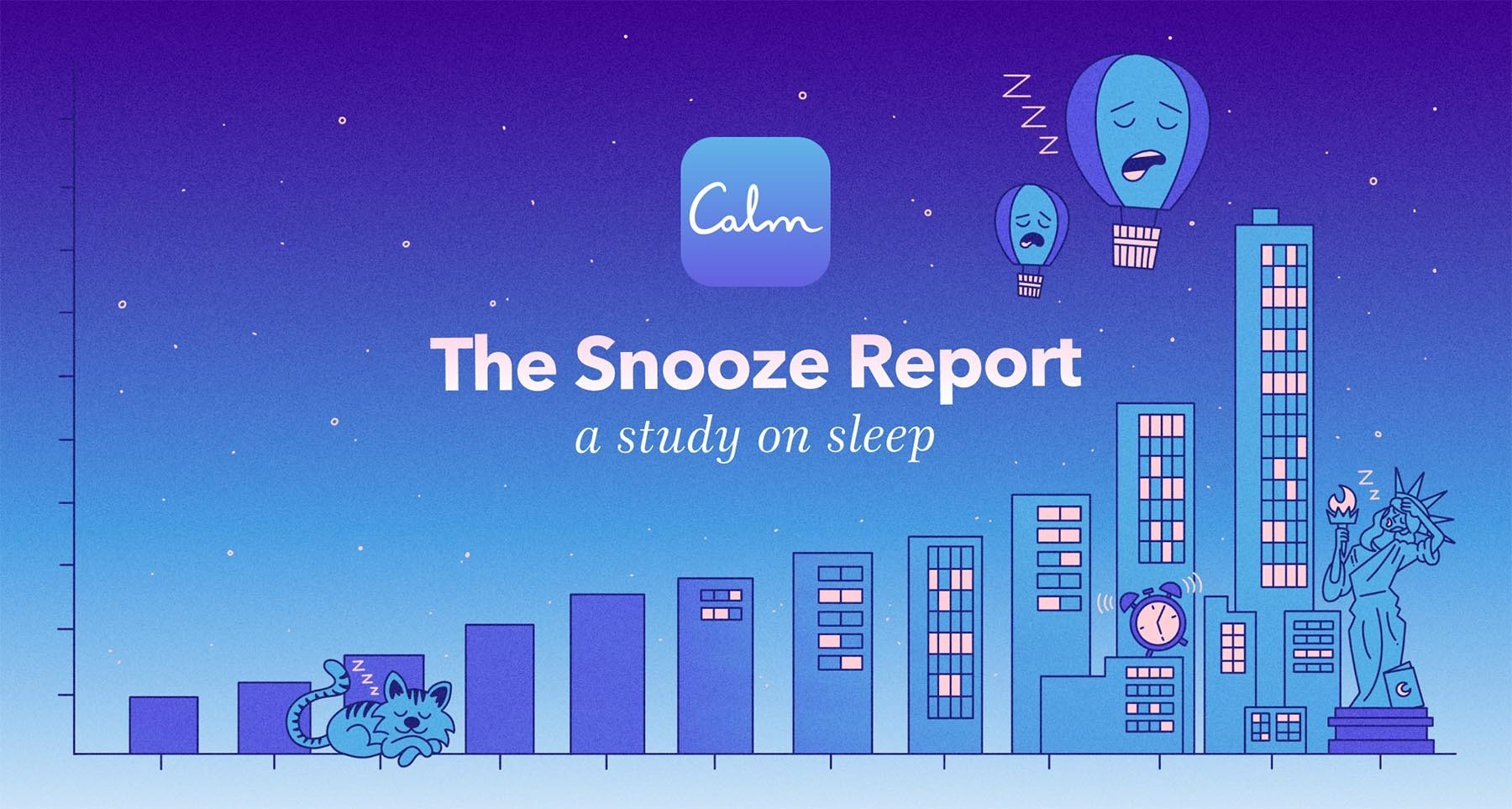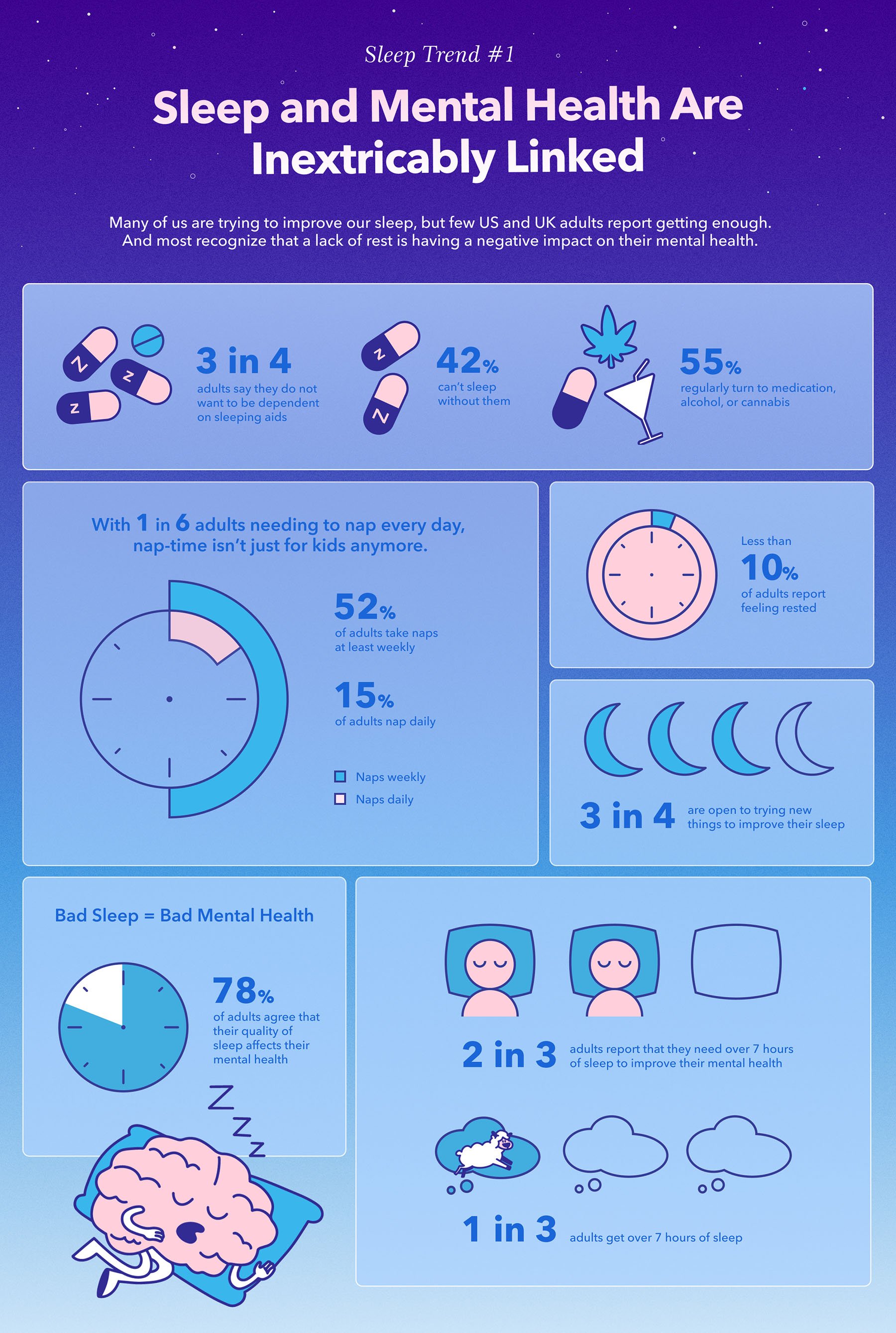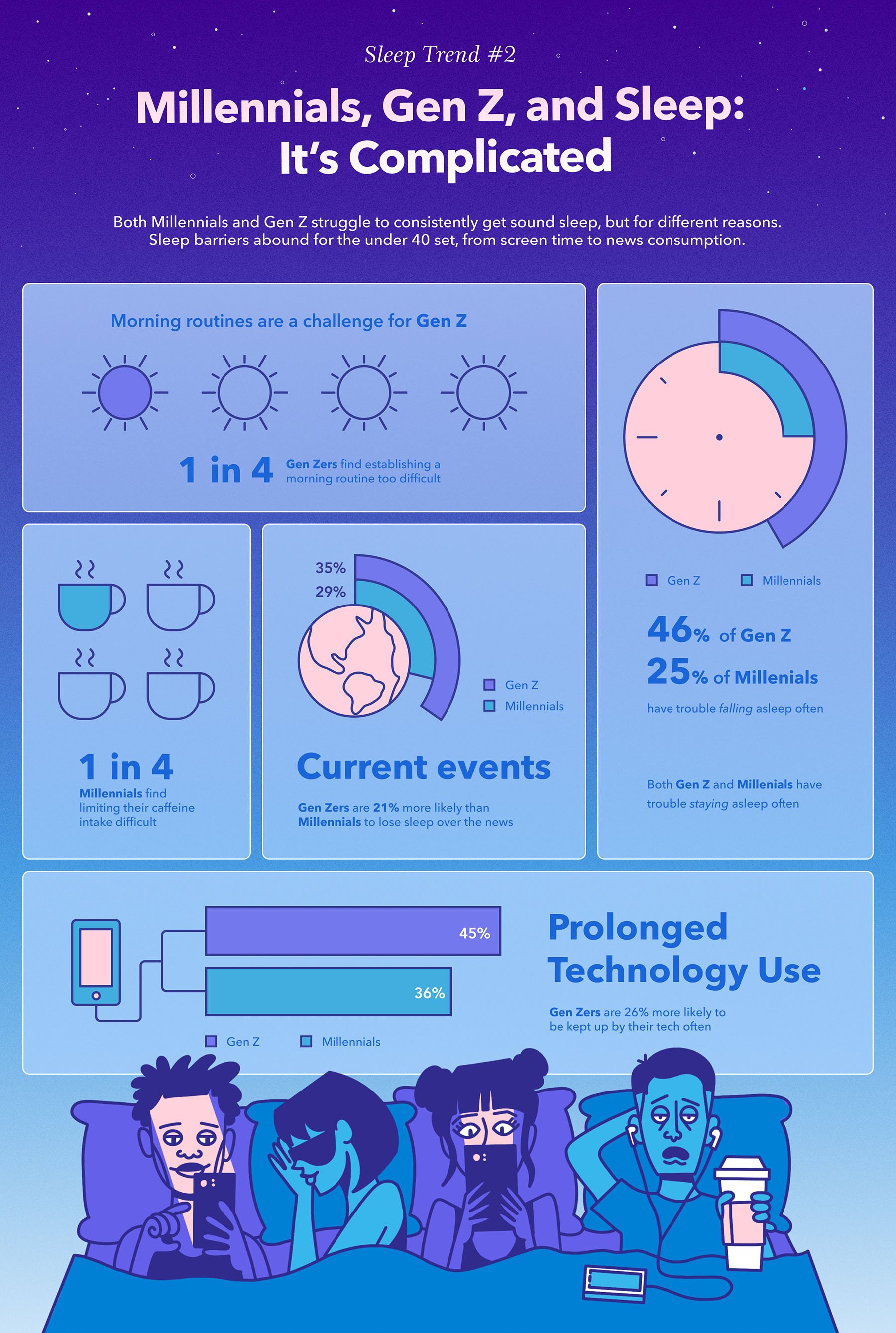Calm presents The Snooze Report: a study on sleep in the US and UK
Calm’s Sleep Study, The Snooze Report, unveils 5 unexpected trends. Plus, the launch of the Sleep Hotline, designed to support those struggling with insomnia.
It’s no surprise people are seeking sleep solutions more than ever in 2023, both worldwide and in the US and UK. The phrase "I’m tired" has reached its highest point ever on Google Trends. This uptick coincides with the fact that a staggering 91% of adults consistently report not feeling well rested, while 78% acknowledge that their sleep quality directly impacts their mental health.
How do we know? Because these were some of the answers that came out of our latest Sleep Study, The Snooze Report, released today.
Calm presents: The Snooze Report
The Snooze Report was created ahead of this year’s Daylight Saving Time —an event that can often disrupt our sleep schedules. In fact, approximately 2 in 3 people report difficulty adjusting.
The Study involved a survey of residents from 10 cities in the US and 10 cities in the UK, all renowned for their sleep issues. It turns out, New York isn’t the only city that never sleeps.
Our objective? To understand the underlying causes behind these widespread sleep challenges. We asked about a variety of factors, including relationships, pets, generational differences, and significant stressors.
And the results may surprise you. For example, did you know that 10% of Gen Z sleeps with a snack? Or that almost half of people take naps at least weekly (maybe that’s why many of us aren’t excited about returning to the office?).
Our insights also raised questions about how societal factors have influenced our sleep patterns. In relationships, for example, 39% of adults report they sleep better solo than with their partner. And ~1 in 3 people say that they have shifted bedtimes as a result of the pandemic.
““Our Sleep Study shines a light not just on the pervasiveness of sleep challenges, but the various forms it can take and the profound connection between sleep and mental health. Establishing a soothing bedtime routine and reducing screen time before bed are two easy steps to improve sleep quality, but learning how to manage stress through mindfulness techniques can have lasting impact. Sleep is the cornerstone of good mental health, and Calm is here to guide you on this journey.” ”
Armed with these tips and revelations on the complex relationship between our sleep habits and overall well being, we’re determined to continue helping people sleep better. In the meantime, we’re excited to introduce a new short term solution.
Can’t sleep? Call Calm’s Sleep Hotline
Calm is rolling out the 1-844-4-CALM-SLEEP hotline (or 0800 368 6836 in the UK), open 24/7 starting on October 30th. This hotline is like your sleep guru, here to share Calm’s sleep content with the millions of people who can’t sleep. You don't need to subscribe or anything fancy; just dial in, choose from a menu of options like soothing sounds, bedtime stories, or breathing exercises and doze off.
The sleepiest cities in the US and UK
The sleepiest cities were determined based on responses to sleep-related questions, with Phoenix and Belfast consistently ranking as the sleepiest cities in the US and UK.
The sleepiest city in the US is Phoenix
Almost 50% of people sleep less than 6 hours per night
1 in 10 adults have sleepwalked
70% of adults say they worry about rising temperatures affecting their sleep quality
77% of adults say they get the least amount of sleep in the summer (highest among parents with young kids - 82%)
The sleepiest city in the UK is Belfast
74% say they need at least 7 hours of sleep to see improvements in their mental health, but 71% get less than 7 hours of sleep per night
25% of Gen Z go to bed after 3am on weekends
26% of adults prefer to sleep with no clothes on
1 in 10 Gen Z’s prefer to sleep with a snack
5 top sleep trends from Calm’s Sleep Study
Drawing on survey data across the US and UK, the report unlocks the following sleep trends.
Sleep Trend #1: Sleep and mental health are inextricably linked
Many of us are trying to improve our sleep, but few U.S. and U.K. adults report getting enough. And most recognize that a lack of rest is having a negative impact on their mental health.
Key findings:
While over 3 in 4 say they do not want to be dependent on sleep aids, almost half (42%) can’t sleep without them. Over half (55%) turn to medication, marijuana/cannabis, or alcohol
91% of adults are not rested or feel tired at least some of the time
Almost 3 in 4 are open to trying new things to improve their sleep (73%)
A majority of adults frequently nap.
Over half of adults take naps at least weekly (52%) with over 1 in 6 napping everyday (15%)
Poor sleep means poor mental health.
78% of adults agree that their quality of sleep affects their mental health
Over 2 in 3 adults (69%) report that they need over 7 hours of sleep to improve their mental health but only 1 in 3 adults (31%) get over 7 hours of sleep
Sleep Trend #2: Millennials, Gen Z, and sleep — it’s complicated
Both Millennials and Gen Z struggle to consistently get sound sleep, but for different reasons. Sleep barriers abound for the under 40 set, from screen time to news consumption.
Key findings:
1 in 4 Millennials find limiting their caffeine intake to be difficult, 14% higher than Gen Z
Morning routines are a challenge for Gen Z, which is 25% more likely to say that having a good morning routine that will help with sleep is difficult
While 38% of Gen Z are affected by current events at night, only 29% of Millennials reported similar issues
Gen Z is 26% more likely to be kept up by prolonged technology use than Millennials. 28% of Millennials are rarely or never kept up by prolonged technology use, 23% higher than Gen Z
46% of Gen Z have difficulty falling asleep often or always, compared to 25% of Millennials. But both groups struggle equally with staying asleep
Sleep trend #3: Our dreams and nightmares are (mostly) based in reality
Our dreams seem to find inspiration in day-to-day life. US and UK adults report dreaming about activities connected to their waking lives, such as video games and social media.
Key findings:
74% of respondents know the people in their nightmares
Over 1 in 3 adults report dreaming about familiar places or people, and romantic or intimate experiences; Around 1 in 10 have dreams about dying (13%)
Gen Z dreams: Gen Z and millennials dream differently, driven by their unique fears, stresses, and daily routines
18% of Gen Z has dreams about dying, 57% higher than millennials
14% of Gen Z has dreams where they are part of a video game, 76% higher than millennials
12% of Gen Z have dreams involving social media interactions, 30% higher than millennials
Sleep trend #4: Counting dollars vs. catching Zs
Financial stress is the source of anxiety most commonly keeping people up at night, a trend that seems to transcend generations and geography.
Key findings:
The #1 subject of stress and anxiety at night for both Gen Z and Millennials is money/finances (51% and 65%, respectively)
In the US and UK, money/finances is the top stressor keeping people up at night (60%)
That's 3x as many people who worry about their kids, and 3x as many who are bothered by the state of the world!
Money worries keep people up twice as much as worries about relationships
Sleep trend #5: Our partners and pets are ruining our sleep
Snoring, arguing, and sharing a bed can lead to restless nights. Go figure: Those we love the most can cause us to sleep the least.
Key findings:
39% of adults report they sleep better solo than with their partner
Over half have adjusted their sleep routine to accommodate their bed partner (56%)
Snoring/disruptive sleep habits and having a fight are the top drivers for partners moving into separate bedrooms
46% of adults report they have trouble sleeping when they are not in their own bed
And it’s not just partners — our pets aren’t helping us sleep either with 1 in 3 adults reporting that their sleep is disrupted by a pet
Sleep Study methodology
Our survey was conducted from August 14th to August 30th, involving 9,500 adults aged 18-65 in the US and UK.
We surveyed 500 respondents per city in the US (10 cities) and 450 respondents per city in the UK (10 cities).
We surveyed respondents based on age, gender, income, ethnicity, and region in proportion to each city's census figure.
Sleep Better with Calm
We are committed to improving your sleep. Dial in to doze off at 1-844-4-CALM-SLEEP (US) and 0800 368 6836 (UK).
It’s time to prioritize your sleep for a healthier, happier life.
Calm your mind. Change your life.
Mental health is hard. Getting support doesn't have to be. The Calm app puts the tools to feel better in your back pocket, with personalized content to manage stress and anxiety, get better sleep, and feel more present in your life.








